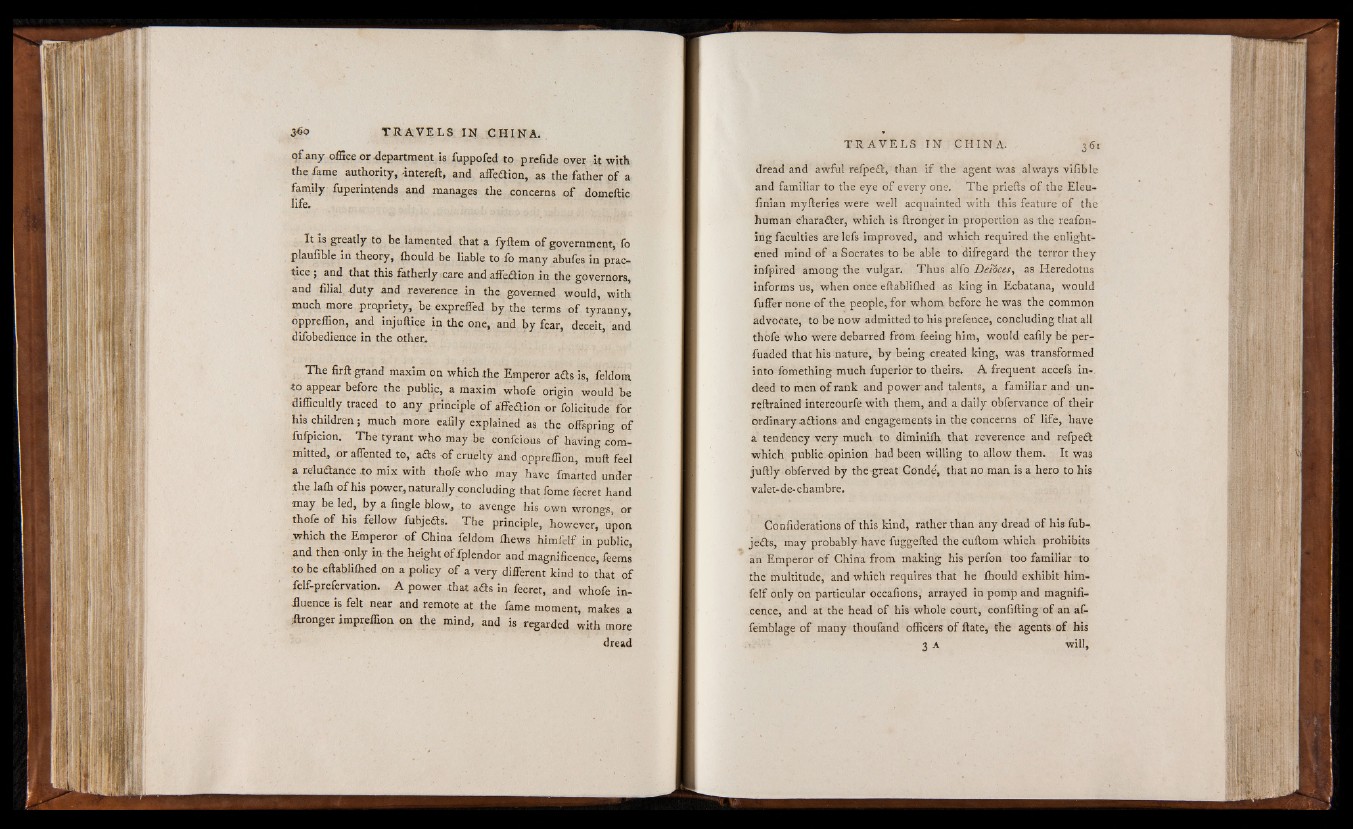
o f any office or department is fuppofed to prefide over It with
the fame authority, -intereft, and affedtion, as the father o f a
family fuperintends and manages the concerns o f domeftic
life.
It is greatly to be lamented that a fyftem o f government, fo
plaufible in theory, ihould be liable to fo many abufes in practice
j and that this fatherly .care and affection in the governors,
and filial duty and reverence in the governed would, with
much more propriety, be expreffed by the terms o f tyranny,
oppreffion, and injuftice in the one, and by fear, deceit, and
difobedience in the other.
T h e firft grand maxim on which the Emperor aits is, feldom
to appear before the public, a maxim.whofe origin would be
difficultly traced to any principle o f affedtion or folicitude for
his children; much more eafily explained as the offspring o f
fufpicion. The tyrant who may be confcious o f having committed,
o r affented to, aits o f cruelty and oppreffion, muff feel
a reluitance to mix with thofe who may have fmarted under
the laih o f his power, naturally concluding that fome fecret hand
may be led, by a Angle blow, to avenge his own wrongs, or
thofe o f his fellow fubjeits. The principle, however, upon
which the Emperor o f China feldom ihews himfelf in public,
and then only in the height o f fplendor and magnificence, feems
to be eftahliihed on a policy o f a very different kind to that o f
felf-prefervation. A power that ads in fecret, and whofe influence
is felt near and remote at the fiime moment, makes a
stronger impreffion on the mind, and is regarded with more
dread
dread and awful refpedt, than if the agent was always vifible
and familiar to the eye o f every one. The priefts o f the Eleu-
finian myfteries were well acquainted with this feature o f the
human character, which is ftronger in proportion as the reafon-
ing faculties are lefs improved, and which required the enlightened
mind o f a Socrates to be able to difregard the terror they
infpired among the vulgar. Thus alfo Deioces, as Heredotus
informs us, when once eftabliihed as king in Ecbatana, would
fuffer none o f the people, for whom before he was the common
advocate, to be now admitted to his prefence, concluding that all
thofe who were debarred from feeing him, would eafily be per-
fuaded that his nature, by being created king, was transformed
into fomething much fuperior to theirs. A frequent accefs in-,
deed to men o f rank and power and talents, a familiar and un-
reftrained intercourfe with them, and a daily obfervance o f their
ordinary adtions and engagements in the concerns o f life, have
a tendency very much to diminiih that reverence and refpedt
which public opinion had been willing to allow them. It was
juftly obferved by thegreat Conde, that no man is a hero to his
valet-de-chambre.
Confiderations o f this kind, rather than any dread o f his fub-
jedts, may probably have fuggefted the cuftom which prohibits
an Emperor o f China from making his perfon too familiar to
the multitude, and which requires that he Ihould exhibit himfelf
only on particular occafions, arrayed in pomp and magnificence,
and at the head o f his whole court, confifting o f an af-
femblage o f many thoufand officers o f ftate, the agents o f his
3 a will,